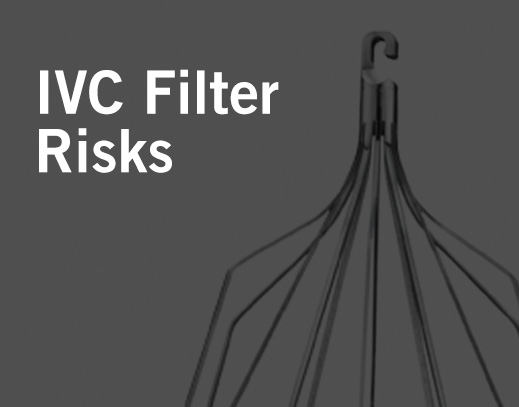 November 30, 2016
November 30, 2016 A hospital in Joliet, Illinois is urging its patients implanted with inferior vena cava filters to have the medical devices removed. Peter Kraus, partner with blood clot filters law firm Waters Kraus Paul & Siegel, says the announcement is not surprising given the number of adverse reports about IVC filters received by the U.S. Food and Drug Administration. Patients and their physicians have reported that inferior vena cava filters have broken apart and migrated within the body, perforating the lungs or heart. As a result, Presence Saint Joseph Medical Center decided to recommend to hospital patients that they undergo an IVC removal procedure.
Bard IVC Filters Known to Fracture and Pierce the Lungs, Heart and Other Organs
Doctors use vena cava filters for patients who have blood clots in their legs and are not good candidates for a blood-thinning medication to prevent pulmonary embolism. An IVC filter medical device looks a bit like a “Daddy Long Legs” spider with thin wire “struts” fanning out in a cone-shape. It is designed to trap blood clots before they are able to make their way to the lungs.
When the FDA approved the IVC filters, the idea was that the medical device would be used temporarily until the risk for pulmonary embolism had passed. The filters were marketed as being “retrievable.” But Presence Saint Joseph Medical Center reports that some patients still have the inferior vena cava filters in their bodies after ten years.
C.R. Bard is the manufacturer of several types of IVC filters, including:
- Bard Recovery;
- Bard G2;
- Bard G2 Express; and
- Bard Eclipse.
A 2012 study showed that the first three Bard IVC filter types had a significant chance of fracturing in the body or of migrating out of place (called “embolization”). The Eclipse filter was not introduced until 2010 so it was not included in the study. Its design is very similar to the Bard G2 IVC filter except that the Eclipse has a smooth electro-polished finish.
Over time, the filters can migrate in the body or fracture, with pieces of the medical device puncturing the lungs, heart or other organs. At Saint Joseph’s in Illinois, patients have presented with broken-off IVC filter struts found inside the heart. The filters also create a risk for cardiac tamponade, which places extreme pressure on the heart caused by a buildup of fluids. IVC filters may also cause cardiogenic shock.
Another problem with Bard IVC filters is that they may not be easily retrievable. The medical journal Endovascular Today estimates that advanced retrieval methods are required in up to 20 percent of retrieval procedures.
According to Peter Kraus, partner with blood clot filters law firm Waters Kraus Paul & Siegel, the FDA’s IVC filter safety warning provides: “Known long-term risks associated with IVC filters include but are not limited to lower limb deep vein thrombosis (DVT), filter fracture, filter migration, filter embolization and IVC perforation.”
Contact Waters Kraus Paul & Siegel about an IVC Filter Lawsuit
Contact blood clot filters law firm Waters Kraus Paul & Siegel by email or call us at 800.226.9880 to learn how we can assist you with an IVC lawsuit.


